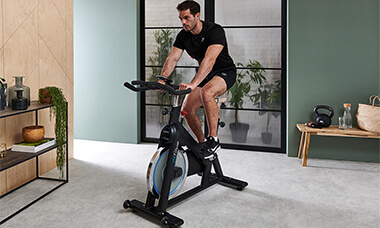
When Is the Best Time to Exercise?
Morning, noon or night. What time of day is best to exercise? Find out as we discuss the pros and cons of working out at different times.
Science suggests that the best time to exercise is the morning. But if you’re not a morning person, don’t sweat it. Because there are advantages to working out in the afternoon or the evening too.
Ultimately, consistency is more important than timing. So once you find a time that works for you, embrace that. If you’re able to work out regularly, you’ll experience the benefits, whatever time you work out.
That said, there are some interesting studies that highlight the physiological pros and cons of working out at certain times. So, let’s explore the evidence as we find out when is the best time to exercise, according to science.
Morning Workouts Help to Burn Fat
Working out in the morning has a number of benefits. Mental health wise, working out first thing can give you a sense of accomplishment that sets a positive tone for the day. There are lots of physical plus points too.
If you work out before breakfast, you give your body an opportunity to burn stored fat. You can burn up to 20 percent more body fat working out on an empty stomach.
Your cortisol levels and growth hormone levels are highest in the morning. This means you metabolise fat more effectively, which is great news if you’re looking to lose weight.

Plus, research suggests that working out in the morning can reduce your appetite throughout the day. Another way in which a morning workout can support your weight loss goals.
Interestingly, if you’re not a morning person, starting to rise early to exercise could help you become one. One study found that exercising at 7am can help you feel more alert in the morning and help you fall asleep earlier in the evening.
If forming an exercise habit is something you struggle with, morning exercise could help. Science suggests that people find it easier to stick to a new activity if they do it in the morning.
Afternoons: Ideal for Long Workouts
If working out in the morning isn’t realistic for you, afternoons are a good second choice. After breakfast and lunch, your blood sugar will be higher, giving you more energy. This is a plus if you are looking to work out intensely or for a long time.
You can still benefit from an improved sleep pattern if you exercise in the afternoon. The study that found morning workouts benefit your body clock, showed afternoon workouts have the same effect.

If you’re looking to lose weight, afternoon workouts may work well for you. You won’t experience the increased fat burning effects of morning exercise, but you could burn more calories. One small study suggests that we burn up to 10 percent more calories in the afternoon.
Evening Workouts Could Increase Performance
Working out in the evening tends to get a bad rep, despite being the most practical option for many people. As working out boosts your cortisol levels, evening workouts may make it harder to fall asleep.
But not all research supports this theory. In fact, some scientists believe that the right type of evening workout could improve your sleep. One study found that resistance exercise, like weight lifting, in the evening actually improved sleep quality and duration.

Another benefit of evening exercise is increased performance. Research suggests that people perform better at physical activities in the evening. Our reaction time also improves later in the day. If your fitness goal is to improve your sporting performance, consider night time training.
Takeaway
So, to summarise, when is the best time to exercise? The answer is: it really depends on your fitness goals.
If you prioritise burning fat, morning exercise is best. Afternoon exercise is a smart choice if you want a long, intense workout, as your energy levels will be higher. And evening exercise could be the best option if your aim is sports performance enhancement.
But whatever time you work out, one thing is for sure: consistency trumps timing. Once you find a workout time that you can stick to, celebrate that. Because regular workouts are ultimately the key to success. Physical health benefits, improved mental health, and enhanced performance will follow. Read the following article to find out how much exercise you should do per week to achieve your goals.
Want More Exercise Advice?
Sign up for our monthly emails for expert training advice and workout plans to help you smash your fitness goals. We will also let you know first about any special offers on our full range of fitness equipment.





